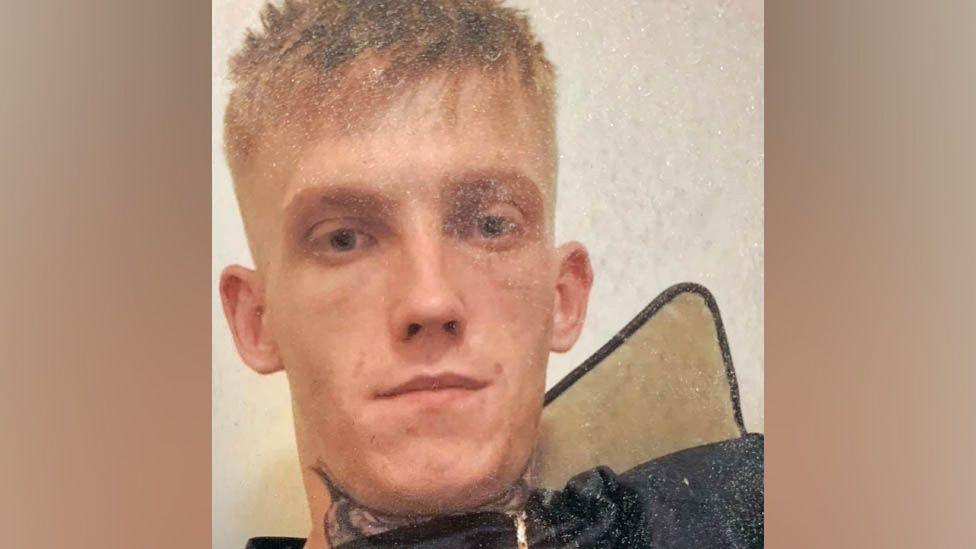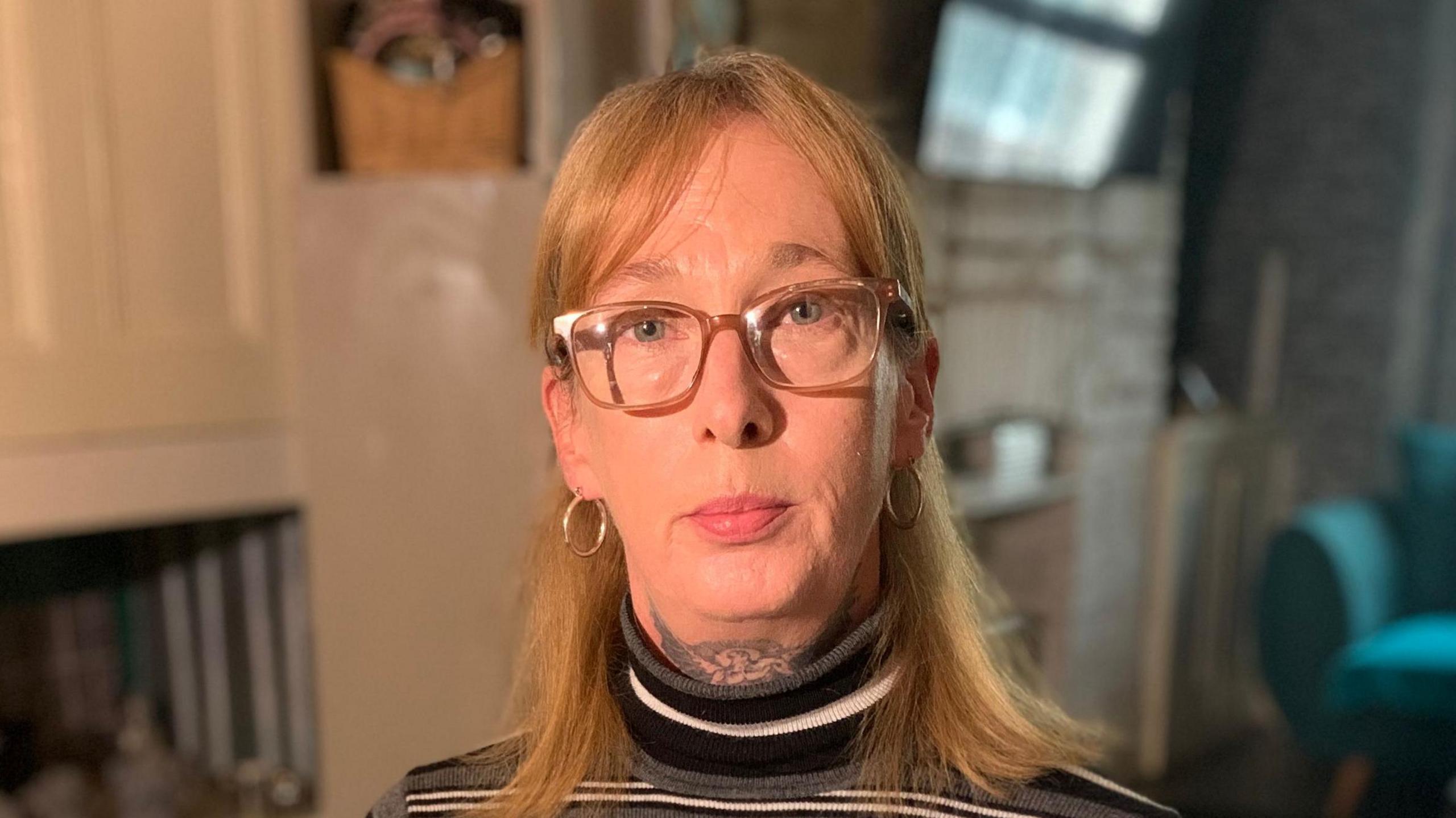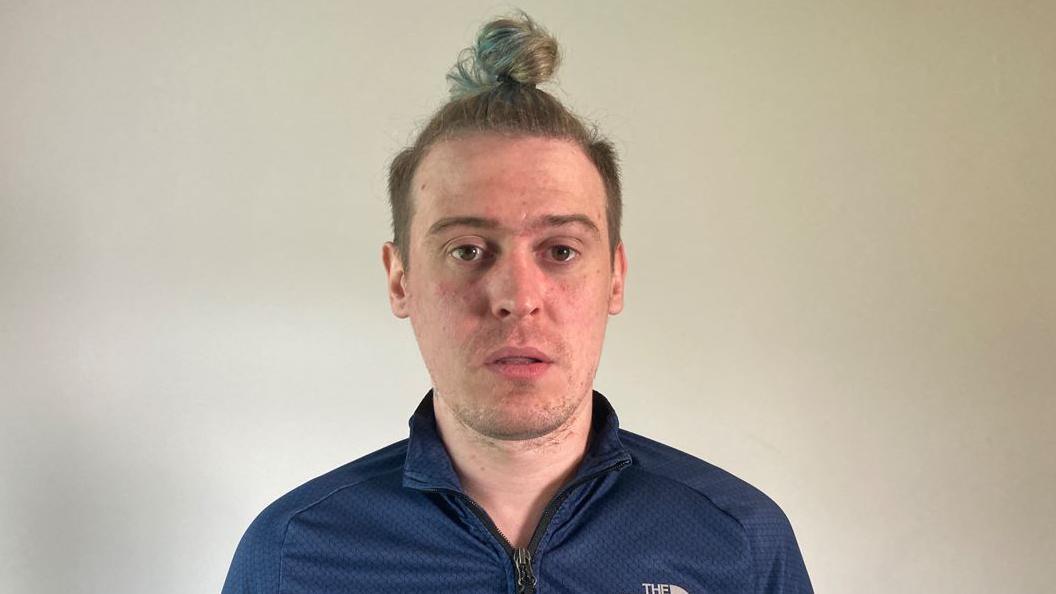Mum says easy drug access caused son's prison death

Ross Appleby died of a drugs overdose after taking the synthetic cannabis known as spice
- Published
A prison where seven inmates died in just over two months will see more deaths if more is not done to stop drugs getting in, a bereaved mother has said.
Clare Jones believes the Ministry of Justice should now take over HMP Parc - currently run by security firm G4S - where her son Ross Appleby, 29, died from an overdose on 18 January last year.
Four of the deaths this year at the prison in Bridgend are thought to be drug-related.
The prison said Mr Appleby's death is being investigated by the prison and probation ombudsman.
Half of prisoners find it easy to get drugs
- Published11 October 2022
Concerns over prison guard and inmate, court told
- Published12 December 2023
The security firm said it had a comprehensive drugs strategy in place to reduce drug ingress, including using technology to stop drugs being brought in by drones, security checks and working with police and substance misuse providers..
The category B local prison opened in 1997 and holds convicted male adult and young offenders and convicted and remand sex offenders.
At the time of a 2022 inspection, external, Parc held 1,623 prisoners, making it one of the largest in the UK.
HM Inspectorate of Prisons said it had a long reputation as a "safe and decent prison", and at the time of the inspection continued "to operate successfully" and was "committed to a culture of rehabilitation".
However the inspector said the ingress of drugs continued to be a big challenge, and while the prison was doing some "impressive work" to reduce the flow, this continued to be a cause of violence.
Mr Appleby had been remanded at Parc in 2022 and was sentenced to a three-year jail term for drug dealing offences.
Ms Jones, from Newport, said she was told by the prison governor that her son had died of a drugs overdose after taking the synthetic cannabis spice, in January 2023.
She said: “It's sad hearing of these deaths... It's not a surprise any more, there's just going to be more and more."

Ms Jones says she fears there will be more deaths at Parc prison due to drugs
Ms Jones said she feared drugs were easy to access at the prison.
"[Ross] was on B wing and said it was like a jungle with no authority," she said.
"It's so easy in there to get whatever you want.
"I know they're in there because they’ve all done wrong, but they're in there to be rehabilitated not killed, and that's basically what's happening."
G4S said it had always worked to stop drugs coming into the prison using robust security measures, including searches of prisoners, visitors and staff, random drug tests, intelligence gathering, and it was working with police and substance misuse services.
The security firm said additional security measures had been put in place and that Naloxone - which temporarily reverses the effects of an opioid overdose - was now widely available at the prison.
Ms Jones said her son's mental health declined after he was stabbed in prison, and he became reliant on drugs.
“G4S need to get out, they're not capable of running a jail," she said.
"They need to go back to being run by the Ministry of Justice."
Describing her son, she said: "He was liked and didn't like conflict and he was a father.
"He wasn't bad, he just made some wrong choices which took him to a bad place."
Synthetic drugs
On 30 April this year Wayne Hay, 47, became the seventh inmate to die at the prison in just over two months.
In March, South Wales Police said nitazene, a synthetic opioid drug, had been identified in connection with four deaths.
The force said spice, another synthetic drug, had also been identified in two of those four deaths.
Zack Griffiths, 31, from Llanelli, Carmarthenshire, has been in 15 prisons over the past seven years, and said HMP Parc was by far the worst.
He was first sent to Parc in 2016 after being found guilty of conspiracy to supply Class A drugs, and was released in 2020.
He was recalled to prison, and said he spent time in Parc from 2022-2023 where he claimed to have witnessed drugs being used in the segregation wing, with the “boys were passing them under the doors”.

Zack Griffiths says Parc is the worst prison he has been incarcerated at
“When I was there, I saw that there was a huge uptake in the amount of drugs that were available," he said.
"It’s this sort of culture that’s been embedded into the prison. It’s been there for years but for some reason it’s just become more prevalent.”
Mr Griffiths described Parc as "chaos", saying there was a lot of violence and self-harm.
“It’s time for G4S to be stripped of their contract," he added.
G4S said it had a number of schemes in place to help prisoners with drug rehabilitation and with mental health issues.
"We completely reject the characterisation presented by Mr Griffiths of HMP Parc," a spokesperson said.
"The health and safety of prisoners and staff is our number one priority.
"As with every other prison in the country, we have comprehensive strategies to root out drugs and contraband.”
"Our thoughts remain with the family and friends of Ross Appleby," they added.
"As with all deaths in custody, this is being investigated by the prison and probation ombudsman and the cause of death is for the coroner to determine."
Additional reporting by Rowenna Hoskin